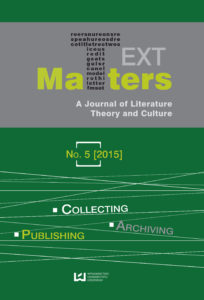To Archive or Not to Archive: The Resistant Potential of Digital Poetry
DOI:
https://doi.org/10.1515/texmat-2015-0002Abstract
This essay addresses the much discussed problem of archiving digital poetry. Digital media are labile, and several writers of digital poetry are incorporating the media’s ephemerality into their poetics. Rather than rehash arguments that have been taking place within the field of digital media and digital poetics for years, I turn to the field of contemporary art curation and preservation, a field in which curators and archivists are struggling with the very immediate concerns, ethical and otherwise, related to archiving works that are made from ephemeral media. One particular digital poem that has recently broken, has recently become unreadable, is Talan Memmott’s Lexia to Perplexia. Memmott composed the poem in 2000, and he incorporated the poem’s inevitable obsolescence into the text of the poem itself. He has since refused to “fix” or “update” the poem, because he contends that that would make it something other than what it was intended to be. Rather, he is choosing to let the poem die because that is what the poem is supposed to do. This essay concludes with a discussion of the political implications of acknowledging the ephemerality of digital media, the resistant potential of the poem when its ephemerality is embraced, and some ways in which archivists can preserve the memory of the poem without necessarily preserving the poem itself.
Downloads
References
Amichai, Yehuda. “Yehuda Amichai: The Art of Poetry No. 44.” Interview by Lawrence Joseph. Paris Review. N.p., Spring 1992. Web. 17 Jan. 2015.
Google Scholar
Cahyka, Kyle. “Candy Sells for $4.5 Million at Philips de Pury Auction.” Hyperallergic.com. n.d. Web. 24 Mar. 2014.
Google Scholar
Critical Art Ensemble. Disturbances. London: Four Corners Books, 2012. Print.
Google Scholar
Damon, Maria, and Ira Livingston. Introduction. Poetry and Cultural Studies: A Reader. Eds. Maria Damon and Ira Livingston. Urbana: U of Illinois P, 2009. 1-17. Print.
Google Scholar
Derrida, Jacques. “Archive Fever: A Freudian Impression.” Diacritics (1995): 9-63. JSTOR. Web. 9 Apr. 2014.
Google Scholar
“Felix Gonzalez-Torres at MMK.” Contemporary Art Daily. 13 Mar. 2011. Web. 9 Apr. 2014.
Google Scholar
Foucault, Michel. The History of Sexuality: An Introduction. Trans. Robert Hurley. New York: Vintage, 1990. Print.
Google Scholar
Gonzalez-Torres, Felix, Jan Avgikos, Tim Rollins, and Susan Cahan. Gonzalez- Torres. New York: A.R.T. Press, 1993. Print.
Google Scholar
Hardt, Michael, and Antonio Negri. Empire. Cambridge: Harvard UP, 2000. Print.
Google Scholar
Hayles, N. Katherine. Electronic Literature: New Horizons for the Literary. Notre Dame: U of Notre Dame P, 2008. Print.
Google Scholar
Hayles, N. Katherine. “Metaphoric Networks in Lexia to Perplexia” Electronic Book Review. Electronic Book Review, 2005. Web. 16 Apr. 2014.
Google Scholar
Hedstrom, Margaret, and Anna Perricci. “It’s Only Temporary.” (Im)permanence: Cultures In/Out of Time. Ed. Judith Schachter and Stephen Brockmann. Pittsburgh: Center for the Arts in Society, 2008. 26-40. Print.
Google Scholar
Joron, Andrew. The Cry at Zero: Selected Prose. Denver: Counterpath, 2007. Print.
Google Scholar
Larsen, Deena. Deena Larsen. n.d. Web. 23 Mar. 2014.
Google Scholar
Memmott, Talan. “Lexia to Perplexia.” n.d. Electronic Literature Collection, Volume One. Web. 20 Apr. 2014.
Google Scholar
Memmott, Talan. Personal Interview. 14 Mar. 2014. E-Mail.
Google Scholar
Montfort, Nick, and Noah Wardrip-Fruin. “Acid-Free Bits: Recommendations for Long-Lasting Electronic Literature.” 14 June 2004. The Electronic Literature Organization. Web. 3 Jan. 2014.
Google Scholar
O’Neill, Mary. “Ephemeral Art: The Art of Being Lost.” Emotion, Place and Culture. Ed. Joyce Davison, Laura Cameron, Liz Bondi, Mick Smith. Burlington: Ashgate, 2009. 149-62. Print.
Google Scholar
Raley, Rita. Tactical Media. Minneapolis: U of Minnesota P, 2009. Print.
Google Scholar
The Renaissance Society at the University of Chicago. “Felix Gonzalez- Torres Traveling October 02-November 06, 1994.” renaissancesociety. org. 1994. Web. 2 Apr. 2014.
Google Scholar
Retallack, Joan. The Poethical Wager. Berkeley: U of California P, 2003. Print.
Google Scholar
Schall, Jan. “Curating Ephemera: Responsibility and Reality.” (Im)permanence: Cultures In/Out of Time. Ed. Judith Schachter and Stephen Brockmann. Pittsburgh: Center for the Arts in Society, 2008. 15-25. Print.
Google Scholar
Virno, Paolo. A Grammar of the Multitude. Los Angeles: Semiotext(e), 2002. Print.
Google Scholar
Whalen, Zach. “Lexia to Perplexia (2000-2013).” Zachwhalen.net. Zach Whalen, 21 Jan. 2014. Web. 17 Apr. 2014.
Google Scholar
Downloads
Published
How to Cite
Issue
Section
License

This work is licensed under a Creative Commons Attribution-NonCommercial-NoDerivatives 4.0 International License.













